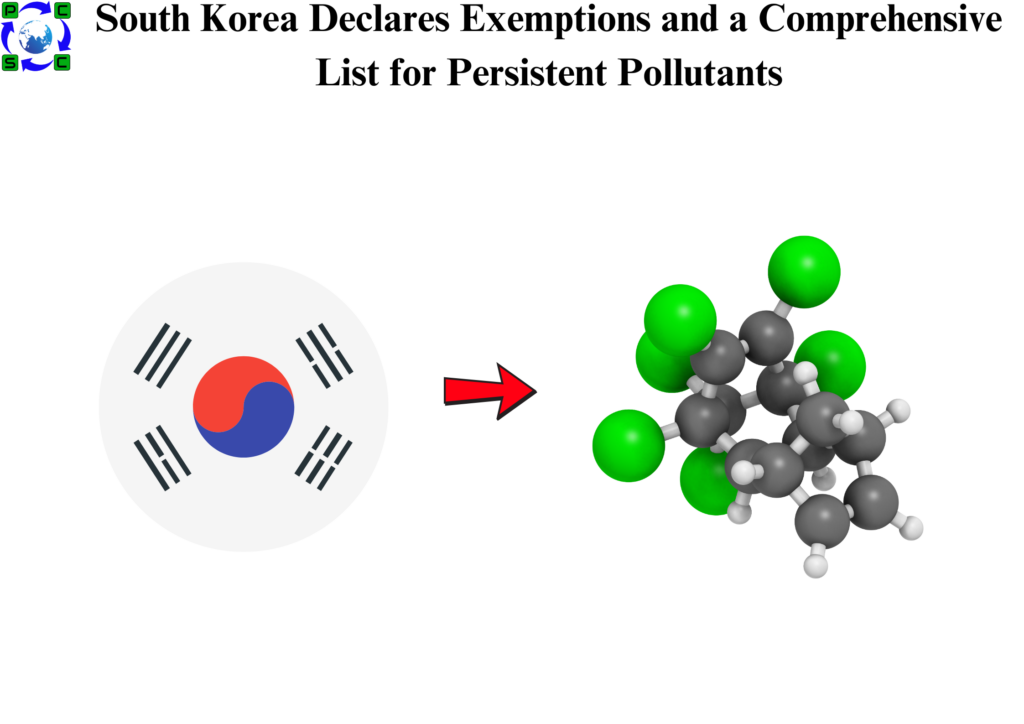 The South Korean Ministry of Environment formally announced a thorough modification of the categories of persistent pollutants and particular exemption laws on September 4, 2024, with the release of Notification No. 2024-571. In accordance with the definition of persistent pollutants provided by the Persistent Organic Pollutants Control Act, this modification attempts to update and specify the particular chemical names and their CAS numbers. In order to maintain public health and environmental protection, the modifications also include explanations on certain exemptions and the dates on which they expire. The period of time for public input is September 23, 2024, until now.
The South Korean Ministry of Environment formally announced a thorough modification of the categories of persistent pollutants and particular exemption laws on September 4, 2024, with the release of Notification No. 2024-571. In accordance with the definition of persistent pollutants provided by the Persistent Organic Pollutants Control Act, this modification attempts to update and specify the particular chemical names and their CAS numbers. In order to maintain public health and environmental protection, the modifications also include explanations on certain exemptions and the dates on which they expire. The period of time for public input is September 23, 2024, until now.
Key Revisions
- Specific labeling of persistent pollutants
The annex’s Table 1 contains a list of the precise chemical names and CAS numbers of the persistent pollutants. According to the Stockholm Convention, materials that are created during manufacturing processes or that are included in Annex A or B are not regarded as persistent pollutants even if they happen to be unintended trace impurities in goods. Mixtures containing longer-chain chlorinated paraffins in excess of 1% by weight are still considered persistent pollutants.
Note: Except for purposes allowed by the Stockholm Convention, substances listed in Annex A (prohibited substances) to Annex B (restricted substances) are either banned or subject to restrictions on their manufacture, use, import, and export. Materials included in Annex C (unintentionally generated compounds) necessitate both emission control strategies and an examination of the sources and amounts of emissions.
- Clarification of specific exemptions
Table 2 of the appendix lists the precise materials and applications that may be freed from the ban and limitations on the domestic manufacture, importation, and use of persistent pollutants in accordance with the Persistent Organic Pollutants Control Act. To guarantee the safe management of certain specially exempted persistent pollutants, the Ministry of Environment will reevaluate the availability of alternatives, socioeconomic implications, and effects on the environment and human health.
- Public Participation and Policy Review
Institutions, groups, or individuals may provide their thoughts to the Ministry of Environment during the public solicitation to be involved in the revision. Beginning July 1, 2024, the Minister of Environment shall examine the notification’s rationality every three years and take appropriate corrective action.
Implementation Time
The additional clause states that this notice is effective right away once it is published. Notably, starting on the date the revised Annex A of the Stockholm Convention becomes operative in South Korea after the tenth meeting of the Conference of the Parties, the content pertaining to substance No. 2022–31 listed in Table 1 (perfluorohexane sulfonic acid and its salts and related compounds) will be implemented. The Minamata Convention-related items listed in Table 2 will come into effect on the day that South Korea adopts the updated Annexes A and B after the Conference of the Parties has its fifth meeting.








 Authorised IMDS & CDX Training & Consulting partner for
Authorised IMDS & CDX Training & Consulting partner for






